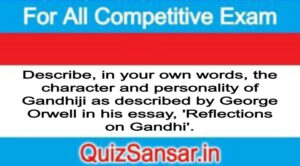
Describe, in your own words, the character and personality of Gandhiji as described by George Orwell in his essay, ‘Reflections on Gandhi’.
Describe, in your own words, the character and personality of Gandhiji as described by George Orwell in his essay, ‘Reflections on Gandhi’.
Or
Gandhiji himself had confessed his shortcomings of his character.
Or
Describe briefly Gandhiji’s saintly ideas.
Or
It should be noted that Gandhiji had practised his saintly ideals in the field of politics. Discuss it.
Or
What do you know about Gandhiji’s ideal of non-violence ? Discuss it.
Ans.
Introduction
As we read this essay, ‘Reflections on Gandhi‘ written by George Orwell, we note that the writer has described his character, his ideals as well as his great virtues. He tried to assess his personality and character only after reading his autobiography which is based on his experiments on truth. Though Gandhiji was a saint, yet the writer had to test his virtue of truth and non-violence before calling him a saint with his noble soul. The writer made two tests to judge him. First, it was to what extent was he moved by vanity? Secondly. “To what extent did he compromise with his principles ?” Its answer was that Gandhiji was humble with his simple life and good thoughts. Secondly Gandhiji showed the necessary virtues to be called a saint.
Gandhiji has confessed his shortcomings
It is true that Gandhiji was a human being yet he had some great virtues. He had confessed some of his shortcomings of his character in his own autobiography but there was not much to confess. First of all, he confessed his habit of smoking in his young age. He also ate meat in that period. All these shortcomings were natural traits of a very youngman on different occasions. It was natural for him in the company of some other boys. It should also be noted that his life was very simple with limited needs of daily life.
Gandhiji’s saintly ideas
As we study the life and character of Gandhiji, we find some saintly ideas like the use of vegetarian life, hatred for drinks. He also practised Brahmacharya, or celibacy in the later part of his middle age. He not only preached saintly ideals but he also practised them in his real life because he regarded them necessary for a religious and spiritual life. He also liked to use non-violence and he liked that his countrymen should use this great ideal in their life as well as in the course of the freedom movement of India. He had taken an oath, the vow of Brahmacharya at the age of thirty five.
Gandhiji had used his saintly ideals also in his political field
The study of this essay, ‘Reflections on Gandhi’ by George Orwell shows it clearly that he had made use of his saintly ideals in the political field first in South Africa fighting against racial differences. He also used these ideals when he was taking his part in the freedom movement of India. Though usually saints and politicians are very different but Gandhiji combined the both in his political activities. It is true that he was a successful political leader and the common masses in India followed him out-and-out to obey his command. His qualities had attracted the people to follow him. The Britishers also admired the use of non-violence used by him successfully. They never objected to his non-violent or peaceful agitation. He had won the heart of his opponents.
The ideal of non-violence
Gandhiji made use of the ideal of non violence in fighting the British rule in India. It had taken the form of Satyagrah which had influenced even the British rulers in India. He had already used it successfully in South Africa. Again he used it in the course of the Freedom Movement of India. The writer was doubtful about its use in any country. He stated that Gandhiji had failed to achieve Hindu-Muslim unity with this method. This method, according to the writer, could not succeed against Hitler in the Second World War.
Conclusion
George Orwell was also impressed by the saintly ideals of Gandhiji. He had compared him with other great men of some other countries. In short his character and virtues had impressed him also. He said about him, “How clean a smell he managed to leave behind.”
-
Write the critical appreciation of the poem No. 12 entitled Far Below Flowed.
-
Write the critical appreciation of the poem No. 11 entitled Leave this Chanting.






